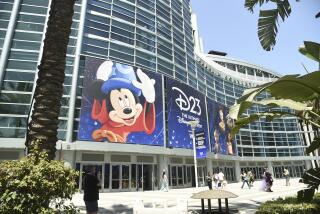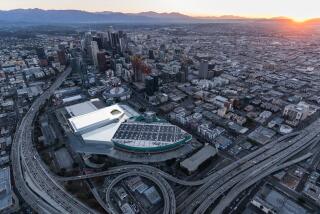Anaheim Still Backs Tourism Growth but Frets About Costs : Attraction: More than half of residents favor proposed entertainment tax to keep the city’s economy sound.
ANAHEIM — Outside of Las Vegas, there may never have been a city more comfortable than Anaheim with wagering on the future.
Bolstered by the successful gamble of a man named Walt Disney, the city left behind its agricultural roots 36 years ago.
Today the city of 270,000, with its landmark theme park, the largest convention center on the West Coast and two professional sports teams, has parlayed its resources to become Orange County’s tourist hub and a premier national vacation and convention destination.
Anaheim residents support the efforts the city is making to attract more tourists, conventions and sports fans to the city, a Times Orange County Poll has found. Yet, the poll also reveals that residents are growing increasingly wary of assuming all the financial risks and want city leaders to impose a tax that would offset the mounting debt.
Slightly more than half of Anaheim residents favor the imposition of a controversial tax on admissions to entertainment venues, including Disneyland, stadium sports events and local movie theaters, in order to keep its tourist-based economy running, according to the poll.
The Times Orange County Poll of 600 Anaheim residents was conducted Feb. 1 through 4 by Mark Baldassare & Associates. The survey has a 4% margin of error.
Long opposed by Disneyland and the city’s professional sports franchises, the admissions tax has become so sensitive that Disneyland President Jack Lindquist warned late last year that such a tax would kill the company’s planned $3-billion expansion in the city.
The poll findings come with the tourist industry caught in the teeth of a recession, but also at a time when Anaheim has at least $4 billion in new projects either underway or on the drawing board, including a rising $100-million arena that has yet to attract a major tenant. City officials are negotiating Anaheim’s share of the Disneyland expansion costs, and the city recently approved a $17-million expansion at the convention center and is already talking about another addition.
“It is a bit overwhelming,” said Allan Hughes, executive director of the Anaheim Chamber of Commerce, which has also opposed the admissions tax. “But I can’t think of any dismal failure where the city stuck its neck out and didn’t get anything back. Anaheim has been the city willing to step up to the plate and make a commitment.”
Even with a declining municipal treasury and fears of what more growth could cost the city, the poll found that Hughes’ brand of “can-do” spirit is playing well among city residents.
From the sports arena to a proposed inner-city rail system that would require significant public financing, residents support the city’s tourist-based development plans, the poll found. They just don’t want to get stuck with the bill for all the new additions.
Fifty-four percent support the city’s current construction of the $100-million Anaheim Arena, despite the fact that there is no major league basketball or hockey team signed yet to play there. (If the arena is not booked, the city could face losses of up to $2.5 million annually for eight years.) Residents opposed to the arena total 42%.
Six of 10 favor construction by the city of two proposed multistory parking garages--to the tune of $500 million--to relieve traffic and parking problems resulting from the Disneyland expansion. The proposed construction of a $750-million “people-mover” elevated rail system in the Disneyland and Convention Center area gets only slim majority support, with 51% favoring the mass transit plan and 45% opposing. (The people-mover concept is expected to get a trial run this summer when the city begins a bus shuttle service connecting the Amtrak station at Anaheim Stadium with employment centers.)
Anaheim already has a significant financial stake in the development of the proposed projects, including possibly $1 billion for the Disney expansion alone.
Fred Sater, spokesman for the California Office of Tourism, said the investments are drawing people and dollars to all parts of the county and the Southern California region.
Anaheim residents “recognize the importance of the Convention Center, Disneyland and sporting events and the money that brings in,” Sater said. “They recognize the trickle-down effect those things have on the shoe store and grocery store down the street.”
JoAnn Melody, a 55-year-old housewife and one of the residents questioned in the poll, said that the projects, however large, are worth the local investment.
“We have friends who work for Disney,” Melody said. “I know the city does things to help them, but Disney helps, too. They bring more people in.”
The pro-growth sentiment is shared by Gina Zazzarino, a 19-year-old junior college student who also works full time at a local finance company. Zazzarino said she would like to see Anaheim follow the phenomenal growth that transformed Orlando, Fla., site of Disney World.
She said the arena will keep residents who normally travel to Los Angeles for concerts and sporting events closer to home, and a new Disney development would expand the city’s employment base.
Anaheim officials in years past, flush with cash from healthy tourist tax revenues, never really had to struggle with paying the bill for future development.
Like other industries, tourism has been slowed considerably by the recession, causing significant declines in the city’s cash supply.
Last year, city officials were forced to reduce services and cut the municipal work force to eliminate a $20-million budget deficit.
That deficit and another one looming this year prompted the creation of a new tax on household utilities and discussions of other new taxes, including the controversial admissions or entertainment tax.
Former City Manager Keith A. Murdoch said Disneyland’s opposition to the admissions tax goes back to Walt Disney, who protested when the city first considered the levy as a way to finance street widenings and utility improvements for the Disneyland area.
“He was quite strong in his feeling about that,” Murdoch said of the theme park’s founder. “He said: ‘Wait a minute, we want to pay our way and we will do so.’ He was firm.”
The conviction has been passed to Disney’s successors who, along with representatives of the California Angels, handily put down a tax threat in 1975.
Lindquist helped lead the opposition then and is in the forefront now. Last year he warned city officials that attempts to revive the tax movement would doom the expansion.
“The Anaheim taxpayers should not bear the burden of our expansion plans. That is why we are working with the city to develop a plan where a portion of the new tax revenues from the Disneyland Resort would be used to pay for much needed public infrastructure improvements,” added Kerry Hunnewell, vice president of Disney Development Co.
“This project will not raise the taxes of Anaheim citizens. Rather, it presents an opportunity to harness the power of private economic investment to benefit the public without affecting the city’s existing sources of revenue and without putting the city’s general fund at risk,” Hunnewell said. “An additional admissions tax that primarily singles out Disneyland is unfair and would seriously undermine the fundamental economic feasibility of the Disneyland Resort.”
Mayor Fred Hunter has said that an admissions tax is no longer an option.
With opposition from the business community so strong, Councilman Tom Daly said the tax would probably meet the same fate it met in 1975.
“Most people in town aren’t comfortable with a new, special tax for the biggest taxpayer in town,” Daly said.
Councilman Irv Pickler has been opposed to the tax for years and believes Anaheim can find alternative methods for financing its growth.
“It’s going to be a paradise,” Pickler says of the Disney expansion. “When I look at the dollars and cents it’s going to bring in, I can’t see a negative thing about it.”
However, the councilman still thinks the city has taken a dangerous risk with the sports arena.
Despite his political opposition, though, Pickler turns out for virtually every arena construction promotion.
“Orange County and the state as a whole benefit by what we have here in Anaheim,” Pickler said. “We have always had a progressive attitude here and the councils before us had the guts to get out there and plan.”
More to Read
Inside the business of entertainment
The Wide Shot brings you news, analysis and insights on everything from streaming wars to production — and what it all means for the future.
You may occasionally receive promotional content from the Los Angeles Times.










